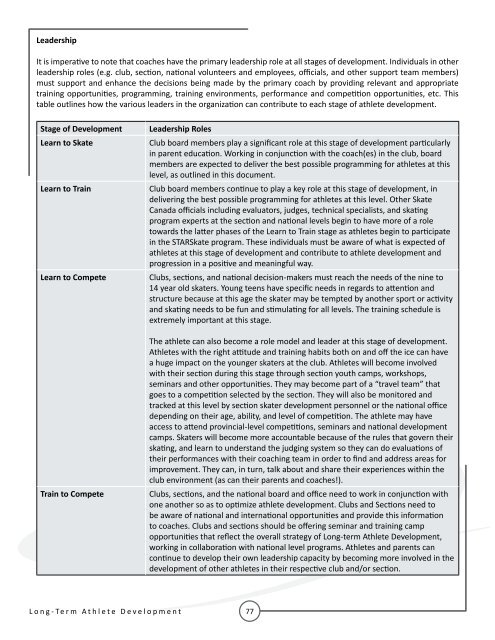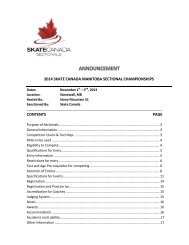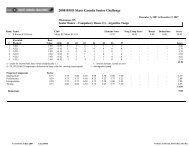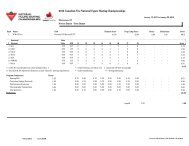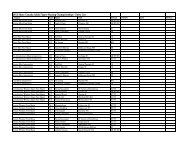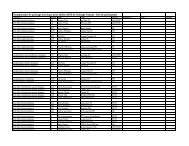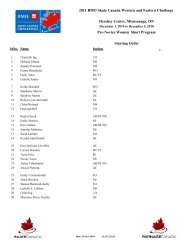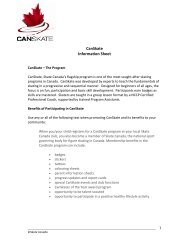LONG-TERM ATHLETE DEVELOPMENT - Skate Canada
LONG-TERM ATHLETE DEVELOPMENT - Skate Canada
LONG-TERM ATHLETE DEVELOPMENT - Skate Canada
You also want an ePaper? Increase the reach of your titles
YUMPU automatically turns print PDFs into web optimized ePapers that Google loves.
Leadership<br />
L o n g - Te r m A t h l e t e D e v e l o p m e n t<br />
77<br />
865 Sheord Road, Ottawa, Ontario K1J 1H9<br />
It is imperative to note that coaches have the primary leadership role at all stages of development. Individuals in other<br />
Phone 613.747.1007 I Toll Free 1.888.747.2372 I Fax 613.748.5718 I Toll Free Fax 1.877.211.2372<br />
leadership roles (e.g. club, section, national volunteers and employees, officials, and other support team members)<br />
must support and enhance the decisions being made by the primary coach by providing relevant and appropriate<br />
training opportunities, programming, training environments, performance and competition opportunities, etc. This<br />
table outlines how the various leaders in the organization can contribute to each stage of athlete development.<br />
Stage of Development Leadership Roles<br />
Learn to <strong>Skate</strong> Club board members play a significant role at this stage of development particularly<br />
in parent education. Working in conjunction with the coach(es) in the club, board<br />
members are expected to deliver the best possible programming for athletes at this<br />
level, as outlined in this document.<br />
Learn to Train Club board members continue to play a key role at this stage of development, in<br />
delivering the best possible programming for athletes at this level. Other <strong>Skate</strong><br />
<strong>Canada</strong> officials including evaluators, judges, technical specialists, and skating<br />
program experts at the section and national levels begin to have more of a role<br />
towards the latter phases of the Learn to Train stage as athletes begin to participate<br />
in the STAR<strong>Skate</strong> program. These individuals must be aware of what is expected of<br />
athletes at this stage of development and contribute to athlete development and<br />
progression in a positive and meaningful way.<br />
Learn to Compete Clubs, sections, and national decision-makers must reach the needs of the nine to<br />
14 year old skaters. Young teens have specific needs in regards to attention and<br />
structure because at this age the skater may be tempted by another sport or activity<br />
and skating needs to be fun and stimulating for all levels. The training schedule is<br />
extremely important at this stage.<br />
The athlete can also become a role model and leader at this stage of development.<br />
Athletes with the right attitude and training habits both on and off the ice can have<br />
a huge impact on the younger skaters at the club. Athletes will become involved<br />
with their section during this stage through section youth camps, workshops,<br />
seminars and other opportunities. They may become part of a “travel team” that<br />
goes to a competition selected by the section. They will also be monitored and<br />
tracked at this level by section skater development personnel or the national office<br />
depending on their age, ability, and level of competition. The athlete may have<br />
access to attend provincial-level competitions, seminars and national development<br />
camps. <strong>Skate</strong>rs will become more accountable because of the rules that govern their<br />
skating, and learn to understand the judging system so they can do evaluations of<br />
their performances with their coaching team in order to find and address areas for<br />
improvement. They can, in turn, talk about and share their experiences within the<br />
club environment (as can their parents and coaches!).<br />
Train to Compete Clubs, sections, and the national board and office need to work in conjunction with<br />
one another so as to optimize athlete development. Clubs and Sections need to<br />
be aware of national and international opportunities and provide this information<br />
to coaches. Clubs and sections should be offering seminar and training camp<br />
opportunities that reflect the overall strategy of Long-term Athlete Development,<br />
working in collaboration with national level programs. Athletes and parents can<br />
continue to develop their own leadership capacity by becoming more involved in the<br />
development of other athletes in their respective club and/or section.


